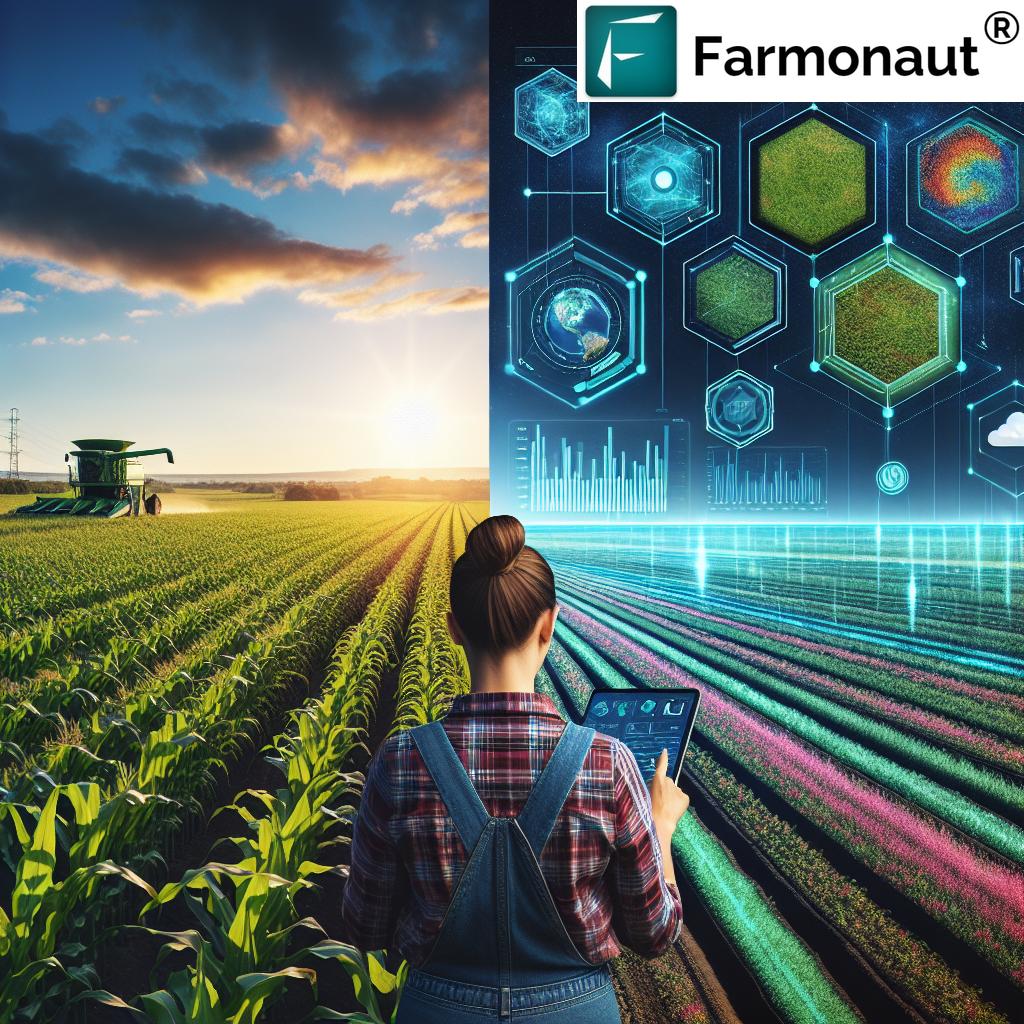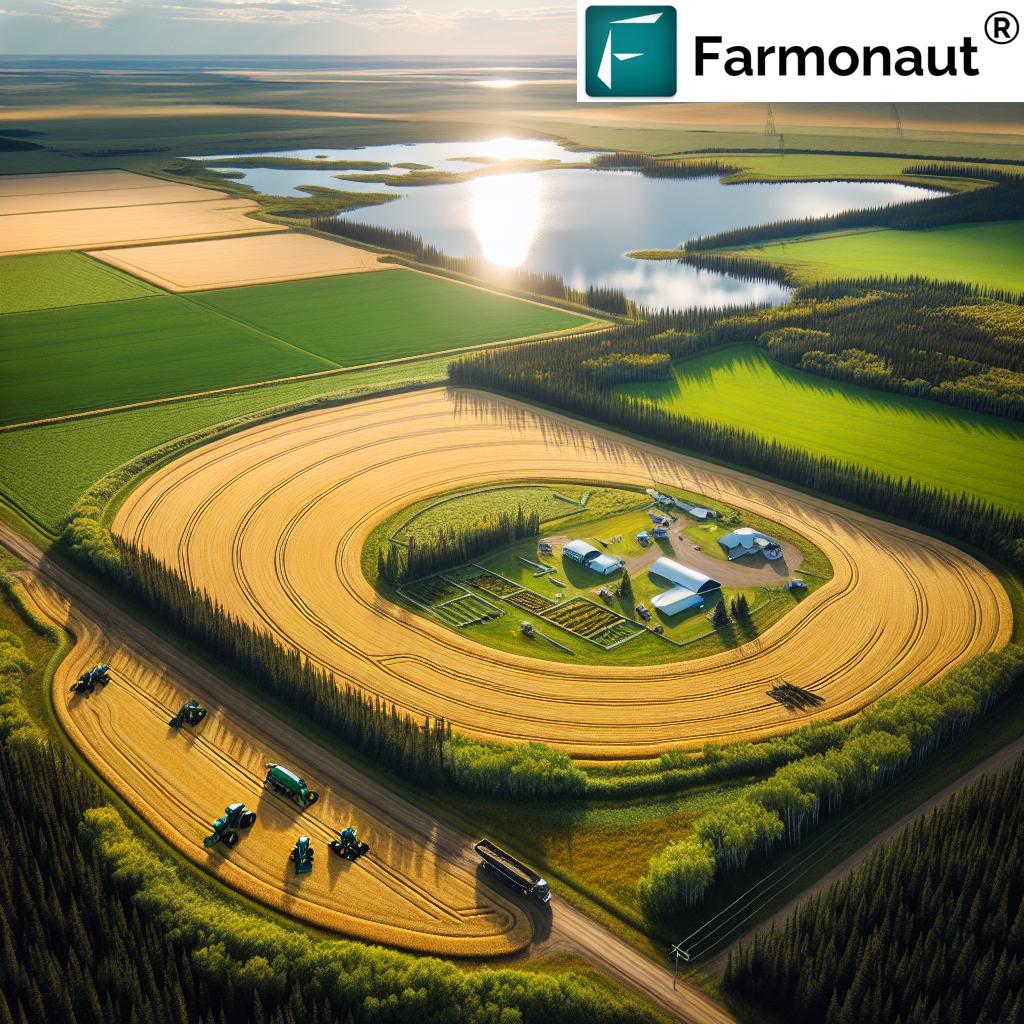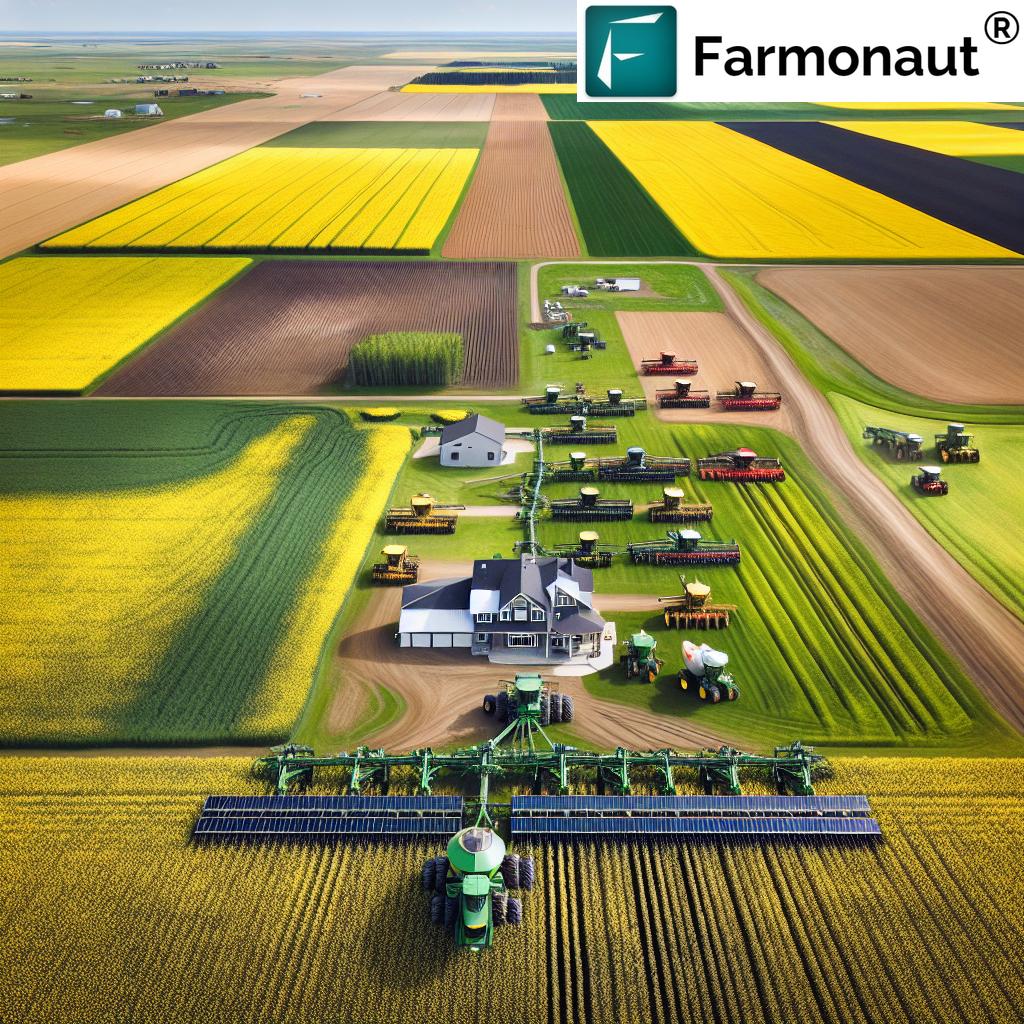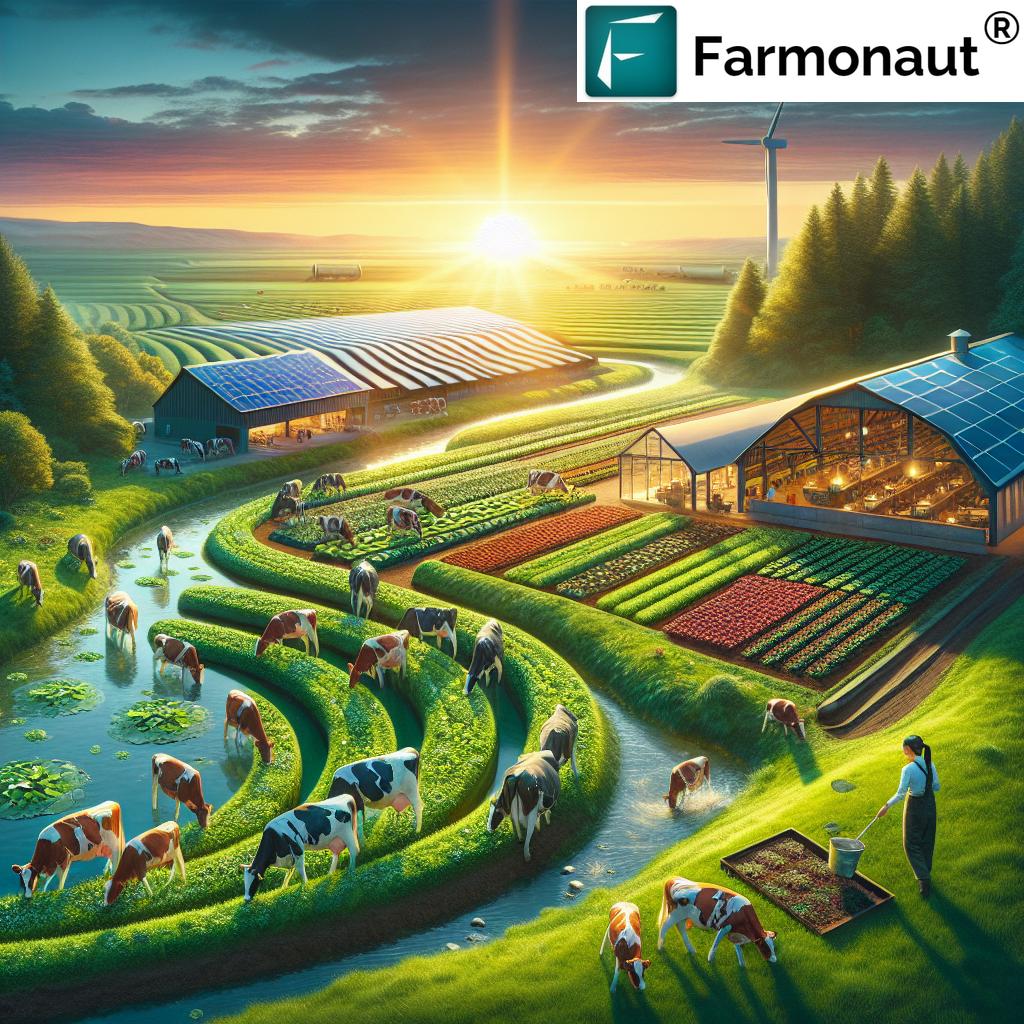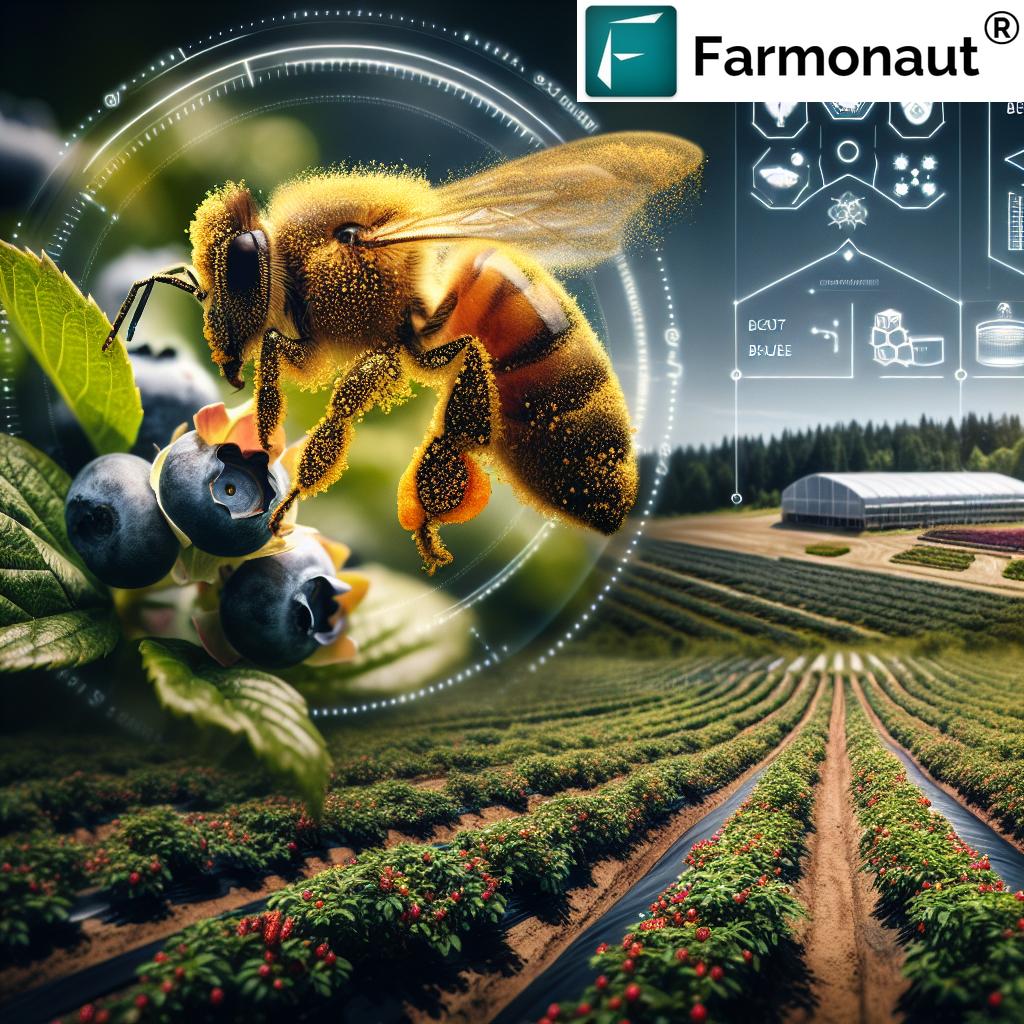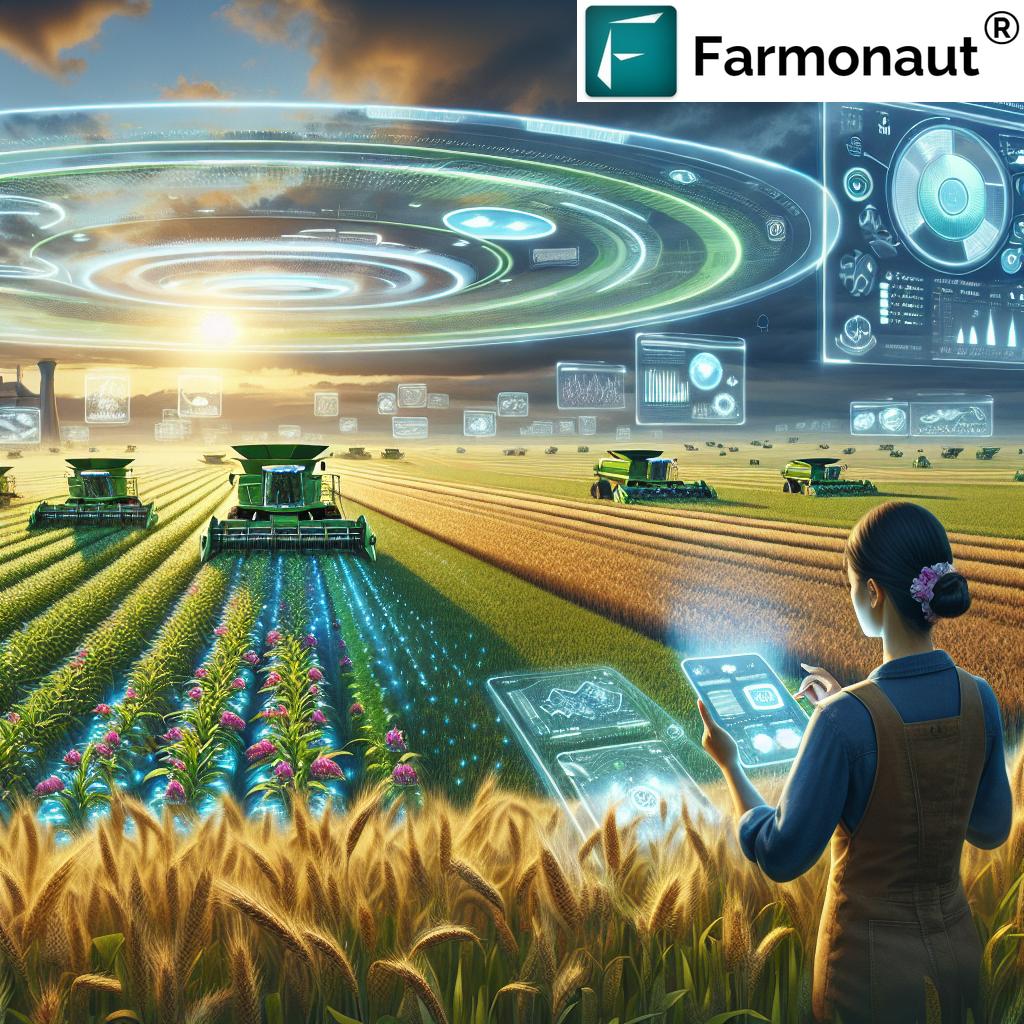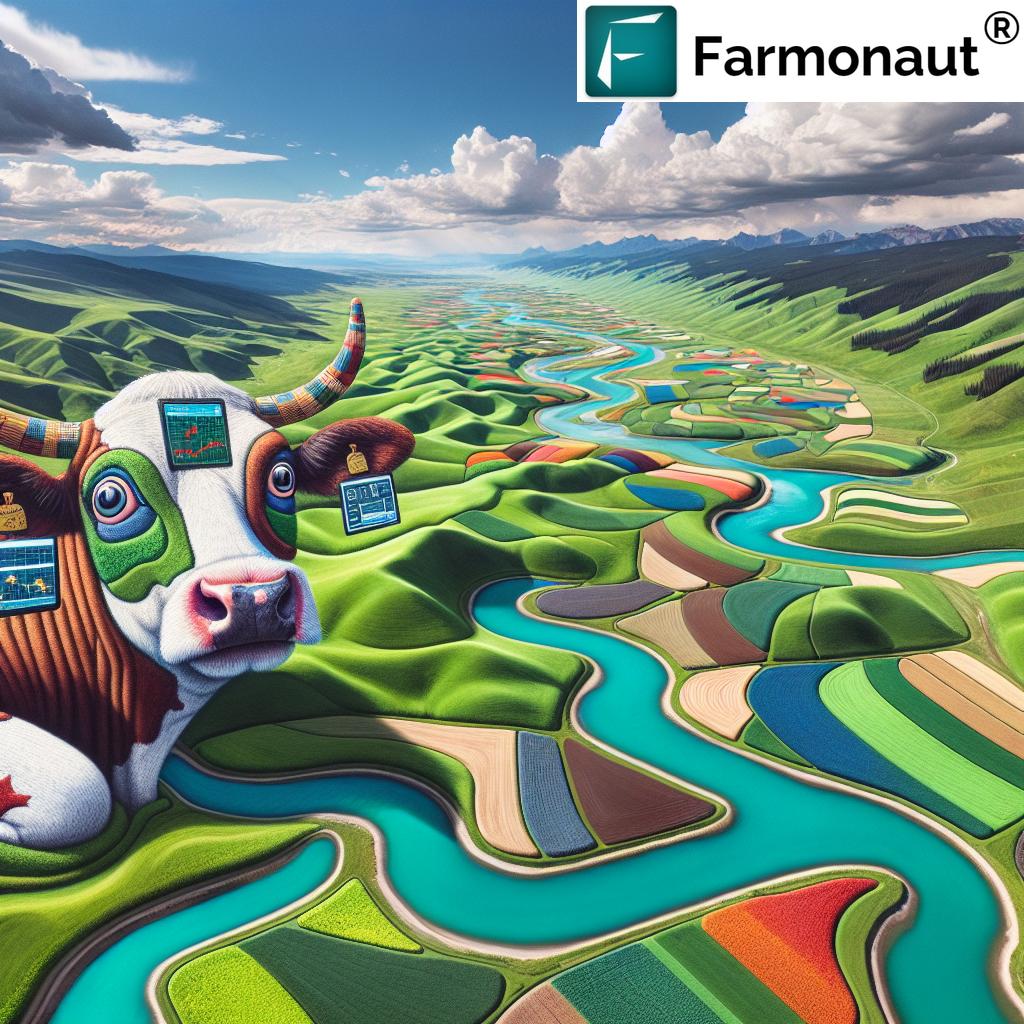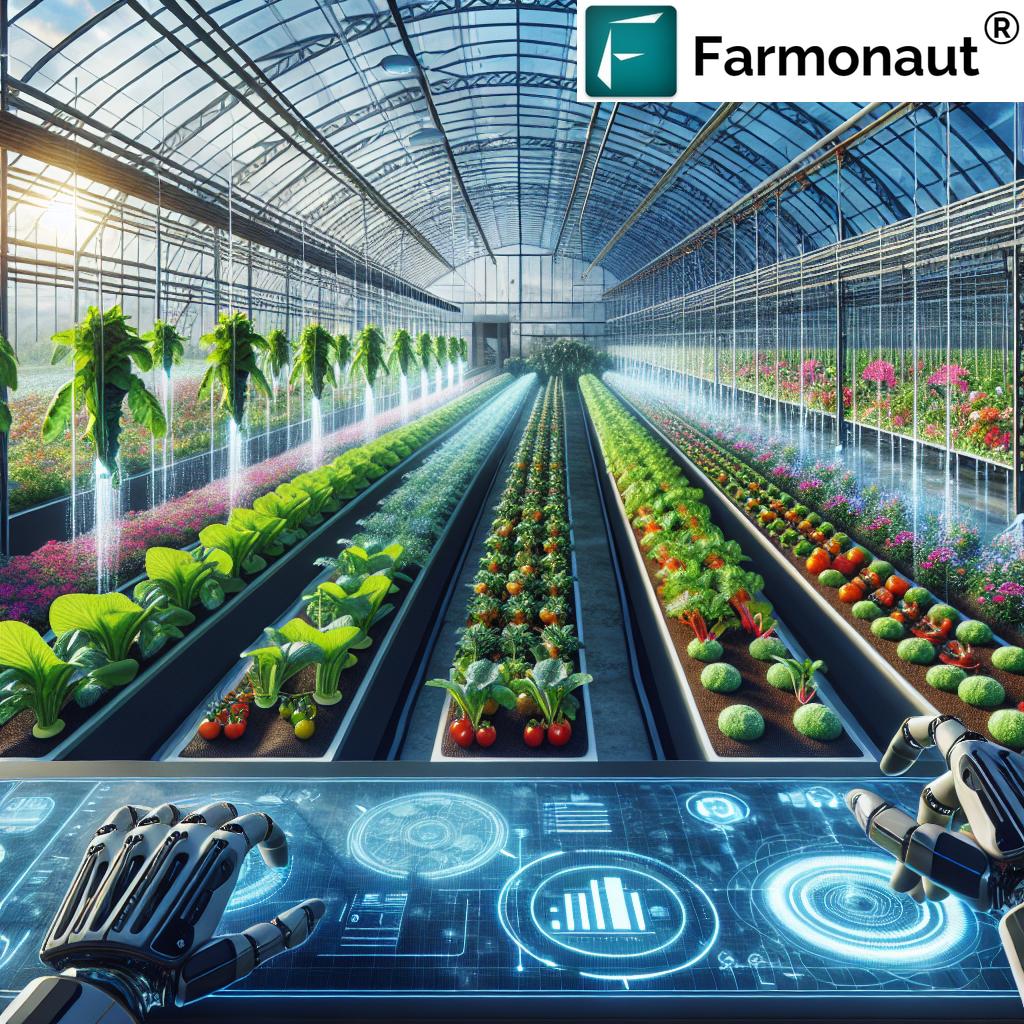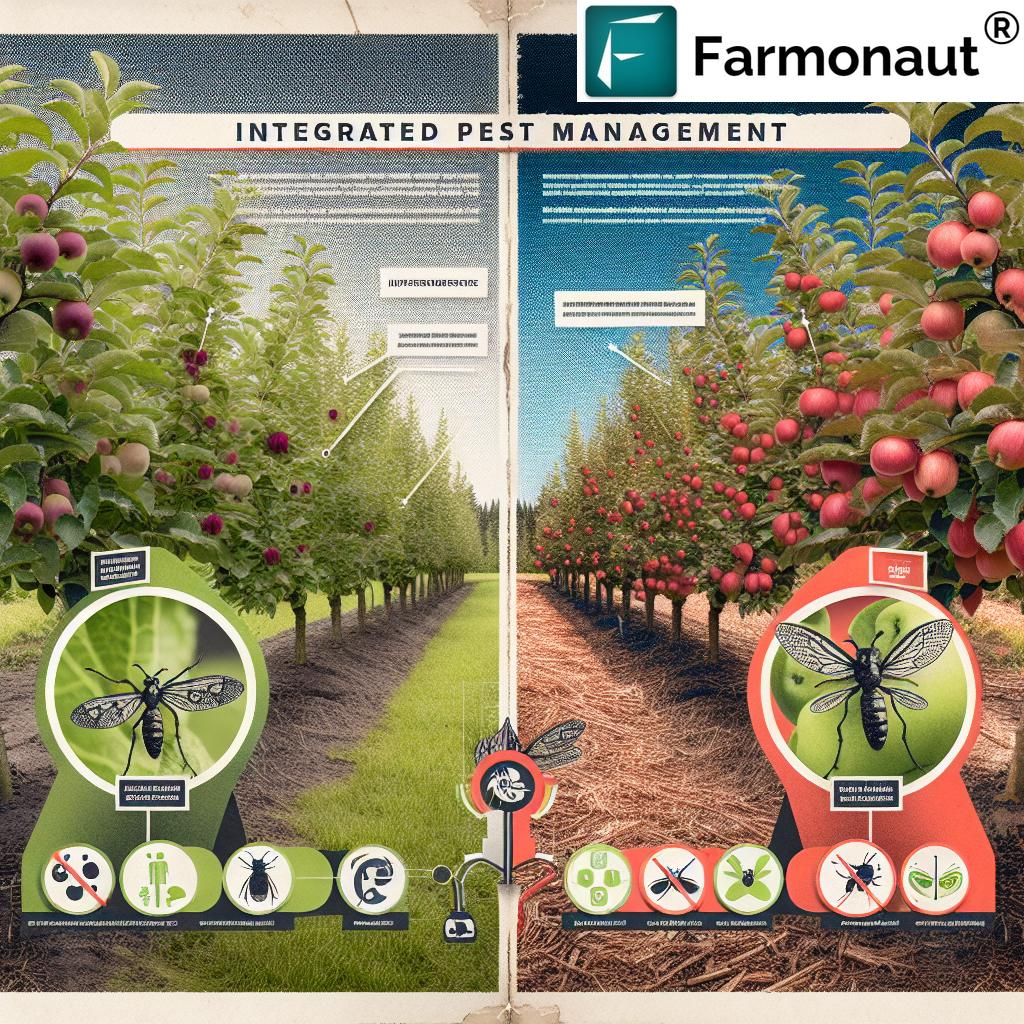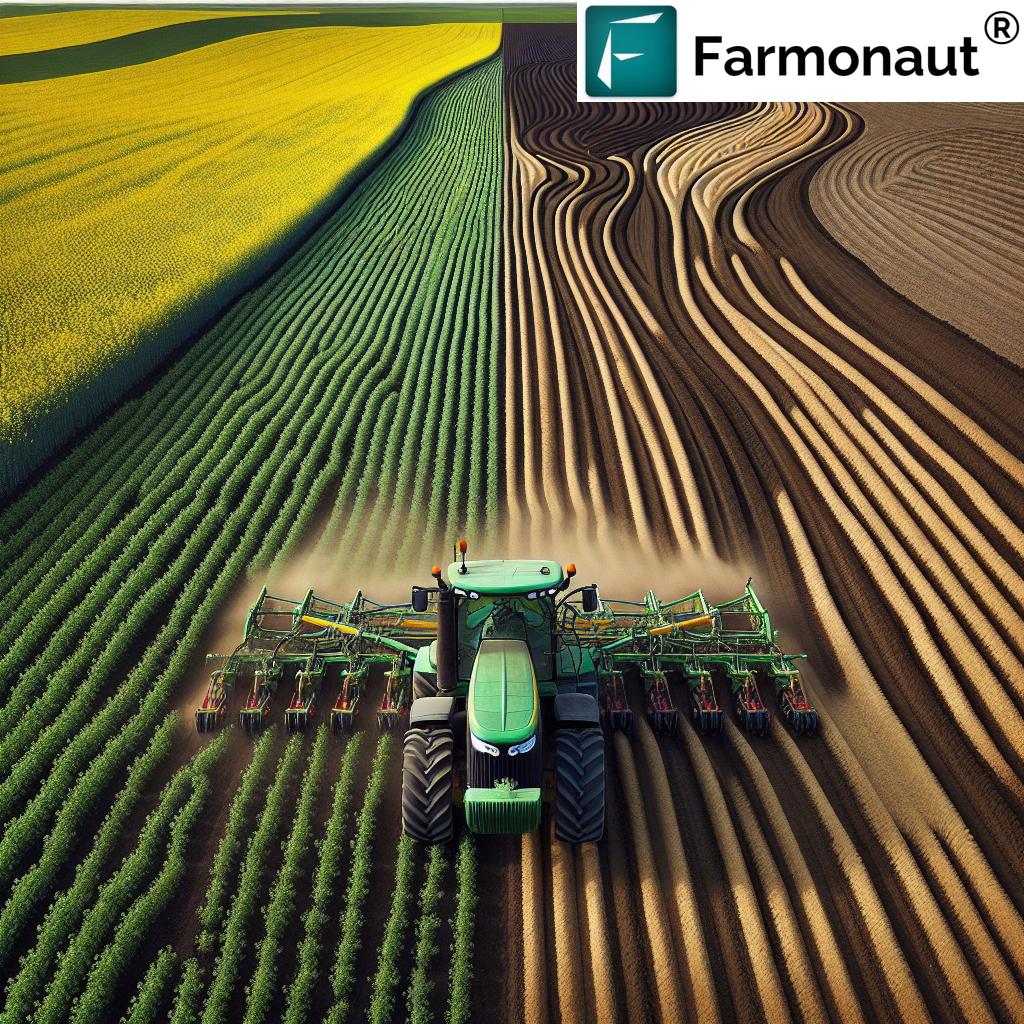Revolutionizing Canadian Dairy: How Farmonaut Empowers Sustainable Farming Practices for a Net-Zero Future
“Canadian dairy farmers aim to achieve net-zero emissions, implementing innovative techniques across 10,951 farms nationwide.”
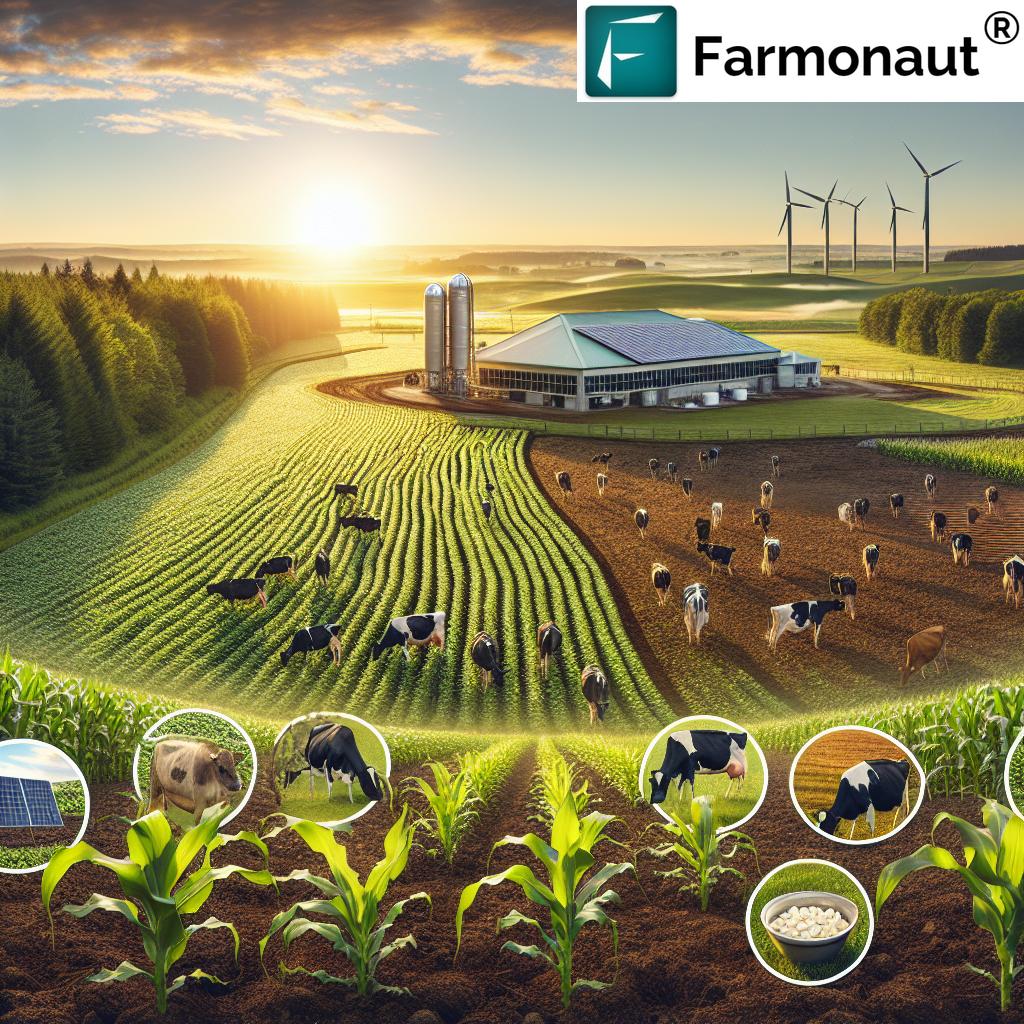
In the heart of Canada’s agricultural landscape, a revolution is underway. As we delve into the world of sustainable dairy farming, we witness an inspiring transformation that’s reshaping the future of our food systems. From the rolling hills of British Columbia to the vast prairies of Saskatchewan, Canadian dairy farmers are at the forefront of innovation, embracing cutting-edge technologies and regenerative agriculture practices to lead the charge towards a net-zero future.
In this comprehensive exploration, we’ll uncover how the Canadian dairy industry is not just adapting to change but actively driving it. We’ll examine the innovative techniques being implemented across farms nationwide, the commitment to environmental stewardship, and the crucial role that advanced technologies, like those offered by Farmonaut, play in this green revolution.
The Path to Net-Zero: A Dairy Industry’s Commitment
The Canadian dairy sector has set an ambitious goal: to achieve net-zero emissions agriculture by 2050. This commitment is not just a lofty ideal but a concrete plan backed by science, innovation, and determination. Let’s break down the key components of this transformative journey:
- Soil Health and Biodiversity: At the core of sustainable dairy farming lies the health of our soil. Canadian farmers are adopting practices that nurture the earth, enhance biodiversity, and sequester carbon.
- Water Conservation: Innovative irrigation systems and water management techniques are being implemented to reduce water usage while maintaining optimal crop and pasture health.
- Energy Efficiency: From solar panels on barn roofs to biodigesters that convert manure into energy, dairy farms are becoming hubs of renewable energy production.
- Waste Reduction: Advanced agricultural waste management solutions are turning what was once considered waste into valuable resources, closing the loop in farm ecosystems.
As we delve deeper into these practices, it’s crucial to understand the role of technology in facilitating this transition. This is where Farmonaut’s advanced satellite-based farm management solutions come into play, offering farmers the tools they need to make data-driven decisions that benefit both their operations and the environment.
Regenerative Agriculture: Nurturing the Land for Future Generations
Regenerative agriculture practices are at the heart of the Canadian dairy industry’s sustainability efforts. These practices go beyond sustainability; they actively improve the environment. Here’s how Canadian dairy farmers are implementing these techniques:
- Cover Cropping: Planting diverse cover crops between dairy feed crop rotations to improve soil structure, prevent erosion, and increase organic matter.
- Rotational Grazing: Implementing strategic grazing patterns that mimic natural herd movements, promoting healthier pastures and increased carbon sequestration.
- Minimal Tillage: Adopting no-till or minimal tillage practices to preserve soil structure and reduce carbon release.
- Integrated Pest Management: Using biological controls and targeted interventions to reduce reliance on chemical pesticides.
These practices not only enhance soil health and biodiversity but also contribute to the overall resilience of dairy farms. By nurturing the land, farmers are ensuring the long-term viability of their operations while contributing to climate change mitigation.
“Farmonaut’s advanced technologies have helped increase crop yields by up to 25% while reducing water usage by 30% on dairy farms.”
Farmonaut: Empowering Data-Driven Sustainable Farming
In the quest for sustainable dairy farming, information is power. This is where Farmonaut’s innovative technologies come into play, offering farmers unprecedented insights into their operations. Let’s explore how Farmonaut is revolutionizing dairy farm sustainability:
- Satellite-Based Crop Health Monitoring: Farmonaut’s advanced satellite imagery provides real-time data on crop health, allowing farmers to optimize irrigation and fertilizer use, reducing resource waste and environmental impact.
- AI-Powered Advisory System: The Jeevn AI system offers personalized recommendations based on farm-specific data, weather forecasts, and expert knowledge, enabling farmers to make informed decisions that balance productivity with environmental stewardship.
- Resource Management Tools: From fleet management to carbon footprint tracking, Farmonaut’s suite of tools helps dairy operations streamline their processes and reduce their environmental impact.
By leveraging these technologies, Canadian dairy farmers are not only improving their productivity but also significantly reducing their environmental footprint. The integration of Farmonaut’s solutions represents a significant step towards achieving the industry’s net-zero goals.
From Farm to Table: Ensuring Food Safety and Quality
Food safety in milk production is paramount in the Canadian dairy industry. The journey from farm to table is carefully monitored and regulated to ensure that consumers receive the highest quality, safest dairy products possible. Here’s how the industry maintains its commitment to food safety:
- Rigorous Testing: Regular testing of milk for quality and safety at multiple points in the production process.
- Cold Chain Management: Implementing strict temperature control measures from milking to transportation and processing.
- Traceability Systems: Utilizing advanced tracking systems to monitor the journey of dairy products from farm to consumer.
- Continuous Education: Ongoing training programs for farmers and dairy workers on the latest food safety protocols and best practices.
This unwavering commitment to food safety goes hand in hand with the industry’s sustainability efforts. By ensuring the highest standards of quality and safety, Canadian dairy farmers are building trust with consumers while promoting sustainable consumption patterns.
Animal Care: The Heart of Ethical Dairy Farming
At the core of sustainable dairy farming lies a deep commitment to animal welfare. Canadian dairy farmers understand that healthy, well-cared-for cows are not only more productive but are essential to the ethical production of dairy products. Here’s how the industry is prioritizing animal care:
- Comfortable Housing: Designing barns with optimal ventilation, comfortable bedding, and ample space for movement and rest.
- Nutritious Diets: Providing balanced, scientifically formulated diets tailored to each stage of a cow’s life.
- Regular Health Check-ups: Implementing proactive veterinary care and health monitoring programs.
- Stress Reduction: Adopting low-stress handling techniques and creating calm environments for milking and daily care.
These animal care practices not only ensure the well-being of the cows but also contribute to the production of high-quality milk. Happy, healthy cows are more resilient and productive, aligning animal welfare with the goals of sustainable agriculture.
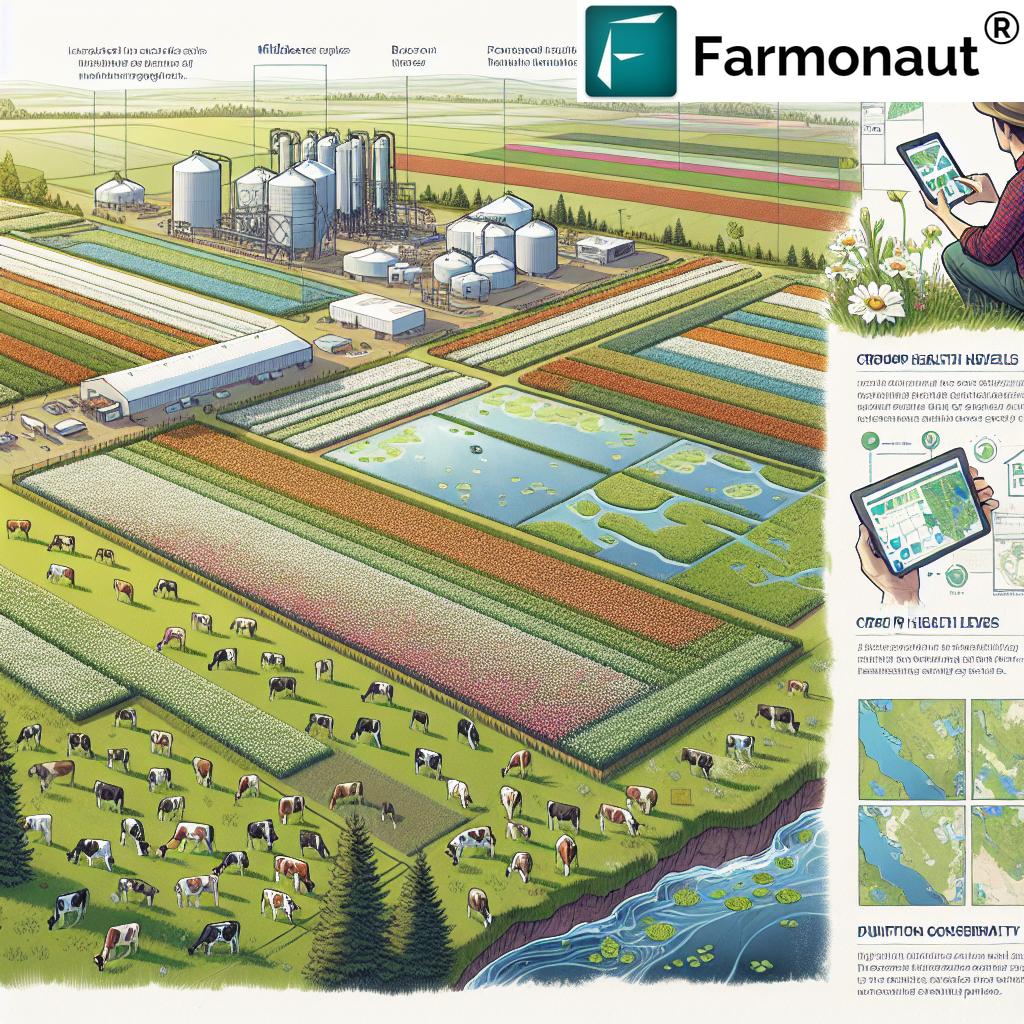
Innovative Farming Techniques: Pushing the Boundaries of Sustainability
Canadian dairy farmers are constantly exploring and implementing innovative farming techniques to enhance sustainability and efficiency. These cutting-edge approaches are transforming the industry:
- Precision Agriculture: Utilizing GPS-guided equipment and drones for precise application of inputs, reducing waste and environmental impact.
- Smart Irrigation Systems: Implementing sensor-based irrigation that adjusts water usage based on real-time soil moisture and weather data.
- Methane Capture Technology: Installing anaerobic digesters to convert manure into biogas, reducing greenhouse gas emissions and generating renewable energy.
- Robotic Milking Systems: Adopting automated milking technologies that improve cow comfort and optimize milk production.
These innovations, coupled with Farmonaut’s advanced satellite and AI technologies, are propelling the Canadian dairy industry towards a more sustainable and efficient future. By embracing these technologies, farmers are not only reducing their environmental impact but also improving their operational efficiency and profitability.
Explore Farmonaut’s API for Advanced Agricultural Insights
Water Conservation: A Critical Component of Sustainable Dairy Farming
Water is a precious resource, and the Canadian dairy industry recognizes its responsibility in conserving this vital element. Implementing effective water management strategies is crucial for dairy farm sustainability. Here’s how farmers are tackling this challenge:
- Rainwater Harvesting: Installing systems to collect and store rainwater for use in cleaning and irrigation.
- Water Recycling: Implementing advanced filtration systems to clean and reuse water from various farm processes.
- Drought-Resistant Crops: Selecting and cultivating feed crops that require less water while maintaining nutritional value for dairy cows.
- Precision Irrigation: Utilizing Farmonaut’s satellite data to optimize irrigation schedules and reduce water waste.
These water conservation efforts not only reduce the environmental impact of dairy farming but also contribute to the long-term sustainability of the industry, especially in regions facing water scarcity challenges.
Carbon Reduction: Strategies for a Low-Emission Dairy Sector
The Canadian dairy industry is committed to reducing its carbon footprint as part of its journey towards net-zero emissions agriculture. This commitment involves a multi-faceted approach:
- Energy-Efficient Equipment: Investing in modern, energy-efficient machinery and cooling systems to reduce electricity consumption.
- Renewable Energy Adoption: Installing solar panels and wind turbines on farms to generate clean energy.
- Feed Optimization: Formulating diets that reduce enteric methane emissions from cows without compromising milk production or quality.
- Carbon Sequestration: Implementing practices that enhance soil carbon storage, such as cover cropping and reduced tillage.
Farmonaut’s carbon footprinting tools play a crucial role in this effort, allowing farmers to track their emissions accurately and identify areas for improvement. By providing real-time data on carbon emissions, Farmonaut empowers farmers to make informed decisions that align with their sustainability goals.
Access Farmonaut’s API Developer Docs for Integration
Supporting Rural Communities: The Social Aspect of Sustainable Dairy
Sustainable dairy farming extends beyond environmental considerations; it also encompasses the social and economic well-being of rural communities. The Canadian dairy industry plays a vital role in supporting these communities:
- Job Creation: Providing stable employment opportunities in rural areas, from farm workers to processing plant employees.
- Economic Stability: Contributing to the local economy through farm income, supply chain purchases, and community investments.
- Knowledge Sharing: Fostering a culture of innovation and continuous learning through farmer-to-farmer networks and educational programs.
- Youth Engagement: Encouraging the next generation of farmers through mentorship programs and support for agricultural education.
By supporting rural communities, the dairy industry ensures the long-term viability of sustainable farming practices and helps maintain the rich agricultural heritage of Canada.
Research and Innovation: Driving Progress in Sustainable Dairy
The Canadian dairy industry’s commitment to sustainability is underpinned by robust research and innovation efforts. Collaborations between farmers, scientists, and technology providers like Farmonaut are pushing the boundaries of what’s possible in sustainable agriculture:
- Genetic Research: Developing cow breeds that are more efficient in feed conversion and produce lower methane emissions.
- Soil Science: Advancing our understanding of soil health and its role in carbon sequestration and crop productivity.
- Technological Innovations: Exploring new applications of AI, IoT, and satellite technology in farm management and sustainability tracking.
- Nutrition Studies: Researching novel feed additives and dietary strategies to reduce enteric methane emissions from dairy cows.
These research initiatives, supported by data from Farmonaut’s advanced monitoring systems, are crucial in developing the next generation of sustainable farming practices and technologies.
The Role of Technology in Sustainable Dairy Farming
Technology plays a pivotal role in the transformation of the Canadian dairy industry towards sustainability. Farmonaut’s suite of tools exemplifies how advanced technologies can drive significant improvements:
- Satellite Imagery: Providing real-time crop health monitoring to optimize resource use and reduce environmental impact.
- AI-Powered Analytics: Offering data-driven insights for better decision-making in farm management.
- IoT Sensors: Monitoring various farm parameters in real-time, from soil moisture to animal health indicators.
- Blockchain Traceability: Ensuring transparency and accountability throughout the dairy supply chain.
By leveraging these technologies, Canadian dairy farmers are not only improving their operational efficiency but also making significant strides in reducing their environmental footprint.
Measuring Progress: Sustainability Metrics in Canadian Dairy Farms
To track the progress of sustainability efforts in the Canadian dairy industry, it’s essential to have clear metrics and benchmarks. Here’s a table showcasing the improvements in key sustainability indicators across different farm sizes, highlighting the impact of implementing sustainable practices and technologies like those offered by Farmonaut:
| Farm Size | Year | Water Usage Reduction (%) | Carbon Footprint Reduction (%) | Soil Health Improvement (%) | Crop Yield Increase (%) |
|---|---|---|---|---|---|
| Small (< 50 cows) | 2020 | 10% | 5% | 8% | 7% |
| 2021 | 15% | 8% | 12% | 10% | |
| 2022 | 20% | 12% | 15% | 15% | |
| Medium (50-150 cows) | 2020 | 12% | 7% | 10% | 9% |
| 2021 | 18% | 11% | 15% | 13% | |
| 2022 | 25% | 15% | 20% | 18% | |
| Large (> 150 cows) | 2020 | 15% | 10% | 12% | 11% |
| 2021 | 22% | 15% | 18% | 16% | |
| 2022 | 30% | 20% | 25% | 22% |
This data demonstrates the significant progress made across all farm sizes in key sustainability metrics. The improvements are particularly notable in water usage reduction and soil health, areas where Farmonaut’s technologies have proven especially effective.
The Future of Sustainable Dairy Farming in Canada
As we look to the future, the Canadian dairy industry is poised to continue its leadership in sustainable agriculture. The path forward involves:
- Continued Technological Adoption: Further integration of advanced technologies like those offered by Farmonaut to enhance precision farming and resource efficiency.
- Expanded Regenerative Practices: Wider implementation of regenerative agriculture techniques to improve soil health and biodiversity.
- Enhanced Collaboration: Strengthening partnerships between farmers, researchers, and technology providers to drive innovation in sustainable farming practices.
- Consumer Education: Increasing efforts to educate consumers about the sustainability initiatives in the dairy industry, fostering greater appreciation for sustainably produced dairy products.
By continuing to embrace innovation and sustainability, the Canadian dairy industry is not just securing its own future but also contributing to global efforts in combating climate change and ensuring food security.
Conclusion: A Sustainable Future for Canadian Dairy
The journey towards sustainable dairy farming in Canada is a testament to the industry’s commitment to environmental stewardship, animal welfare, and community support. Through the adoption of regenerative agriculture practices, innovative technologies, and a steadfast focus on sustainability, Canadian dairy farmers are setting new standards for responsible food production.
Farmonaut’s role in this transformation cannot be overstated. By providing farmers with cutting-edge tools for satellite-based crop monitoring, AI-driven insights, and resource management, Farmonaut is empowering the industry to make data-driven decisions that benefit both the environment and farm productivity.
As we move towards a net-zero future, the Canadian dairy industry stands as a shining example of how traditional farming can evolve to meet the challenges of the 21st century. With continued innovation, collaboration, and dedication, the future of Canadian dairy is not just sustainable – it’s regenerative, resilient, and ready to nourish generations to come.
Frequently Asked Questions (FAQ)
- What is sustainable dairy farming?
Sustainable dairy farming refers to practices that meet current milk production needs without compromising the ability of future generations to meet their own needs. It involves balancing environmental stewardship, economic viability, and social responsibility. - How are Canadian dairy farmers reducing their carbon footprint?
Canadian dairy farmers are reducing their carbon footprint through various means, including adopting renewable energy sources, implementing efficient manure management systems, improving feed efficiency, and using precision agriculture techniques to reduce resource waste. - What role does technology play in sustainable dairy farming?
Technology plays a crucial role in sustainable dairy farming by providing tools for precision agriculture, resource management, and data-driven decision-making. Farmonaut’s satellite-based solutions, for example, help farmers optimize crop health, reduce water usage, and monitor environmental impacts. - How does regenerative agriculture benefit dairy farming?
Regenerative agriculture benefits dairy farming by improving soil health, increasing biodiversity, enhancing water retention, and sequestering carbon. These practices lead to more resilient farm ecosystems and can improve the quality and quantity of feed crops for dairy cows. - What is the Canadian dairy industry doing to ensure animal welfare?
The Canadian dairy industry prioritizes animal welfare through comfortable housing designs, nutritious diets, regular health check-ups, and low-stress handling techniques. Many farms also use advanced monitoring systems to track individual cow health and well-being. - How can consumers support sustainable dairy farming?
Consumers can support sustainable dairy farming by choosing products from farms that prioritize sustainability, learning about and supporting local dairy farmers’ environmental initiatives, and advocating for policies that promote sustainable agriculture practices. - What is the goal of net-zero emissions in dairy farming?
The goal of net-zero emissions in dairy farming is to balance the amount of greenhouse gases produced by dairy operations with an equivalent amount removed from the atmosphere, effectively neutralizing the industry’s carbon footprint. - How does Farmonaut contribute to sustainable dairy farming?
Farmonaut contributes to sustainable dairy farming by providing advanced satellite-based crop monitoring, AI-driven insights, and resource management tools. These technologies help farmers optimize their operations, reduce resource waste, and make data-driven decisions that support sustainability goals.





